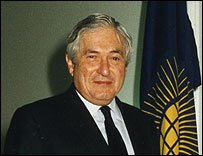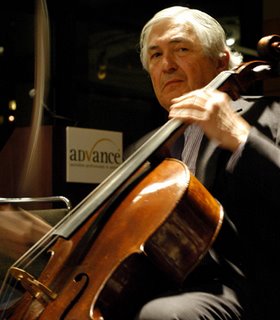 The former President of the World Bank, James Wolfensohn delivered the Ninth Commonwealth Lecture in London on Thursday 2 March 2006, which I was invited to attend. The lecture was on the theme: The Future Role of the Commonwealth: A Bridge Between an Emerging Three-Speed World.
The former President of the World Bank, James Wolfensohn delivered the Ninth Commonwealth Lecture in London on Thursday 2 March 2006, which I was invited to attend. The lecture was on the theme: The Future Role of the Commonwealth: A Bridge Between an Emerging Three-Speed World.In his lecture, Mr. Wolfensohn outlined how sweeping changes to the global economy over the next 40 years could produce three distinct but interconnected spheres of varying levels of wealth and development, presenting the Commonwealth with new opportunities but also added challenges. According to Mr. Wolfensohn, developed high-income countries will form the first tier. They will continue to be some of the wealthiest countries on the planet but may slowly lose their economic dominance to the second group of countries, which would include Brazil, China, India and Russia. This second tier will be home to almost half of humanity and could become the new centre of economic power. The third tier will be made up of those countries held back by political, social, and institutional factors. These countries will struggle with widespread poverty but will remain an integral part of the global economy and world social order.
Mr. Wolfensohn said that the Commonwealth could bridge the gap between the different levels of development among its member countries by finding a common ground through shared values. He said the Commonwealth could address the disparities between the high, middle and low-income countries through close collaboration based on a shared heritage of history, language and values. He stated that high income Commonwealth developed countries such as Australia, Canada, New Zealand and the UK will continue to enjoy a major share of global economic growth, while middle income countries such as India, Malaysia, Nigeria and South Africa will enjoy healthy growth in their gross domestic product. Low income and poor countries may languish in poverty if faced with low economic growth but high population growth. Adding to this situation is the disparity in the volumes of foreign direct investment and trade among countries that fall into the three different tiers of development. Mr. Wolfensohn pointed out that these factors have a role in determining the level of equitable growth and social justice that in turn affect global stability.
Strong leadership, accountability and eradication of corruption can make a difference in a country's progress, said Mr. Wolfensohn. Apart from these, having the know-how, coupled with strategic planning and implementation of development programmes, can enhance the growth process. Educated and healthy populations are also critical factors, he added. Mr. Wolfensohn stressed that the Commonwealth has tremendous strengths that can be drawn from its association of 53 countries with close to 2 billion in total population. He commended the Commonwealth for its work that is targeted at promoting peace and democracy, human rights, the rule of law, good governance, public sector reform, gender equality, education, health and trade to advance sustainable development.
After his lecture I asked him a question about what he would do differently to address the interlinking issues of Poverty and Environment if he could go back on a time machine to 1995 when he joined the World Bank. He gave me a 5 min long answer stating the fact that he was not able to do much in that sector and wished he had got more time to deal with the nexus of Poverty and Environment, especially in the least developed countries. He did mention the mainstreaming of the Poverty and Environment linkages and that the World Bank Institute was developing new training programmes to sensitise development professionals globally how to address these two interlinking issues at the same time.

We later continued our discussion over a glass of red wine at the reception that followed with his wife Elaine who also went to Columbia University and recognised the Columbia pin on my jacket. James later gave me his business card and asked me to look him up when I crossed over the creek to New York. What impressed me was that he learnt to play the cello at 40 and is a great lover of classical music. After he left the World Bank in June 2005, he was appointed Special Envoy by the Quartet for the Gaza Disengagement, which comprises the United States Secretary of State, Condoleezza Rice; the Russian Foreign Minister, Sergei Lavtov; the European Union High Representative for the Common Foreign and Security Policy, Javier Solana and United Nations Secretary-General, Kofi Annan.
No comments:
Post a Comment